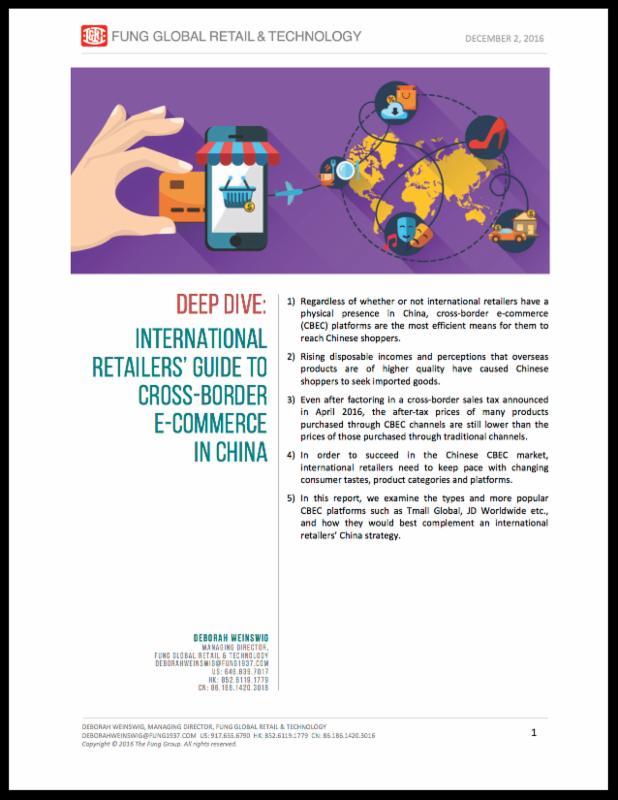International retailers must complement existing expansion strategy with online sales platforms
December 7, 2016 —
NEW YORK (December 5, 2016) – Looking for quality and affordability, increasingly affluent and sophisticated Chinese shoppers are seeking products from overseas, and international retailers are finding that cross-border e-commerce (CBEC) will be the most efficient platform to reach them, says “International Retailers’ Guide to Cross-Border E-Commerce in China,” a new report from international think tank Fung Global Retail & Technology.
The purchase of overseas products online is expected to increase to US$285 billion in 2018, up from US$136 billion in 2015 as Chinese authorities have eased rules about online purchases. In addition, e-commerce purchases reduce concerns about authenticity, and are taxed less heavily thus lowering prices for consumers, writes Deborah Weinswig , Managing Director of Fung Global Retail & Technology. As a result, it is projected that 25 percent of the population will shop on foreign sites or through third parties in 2020, up from 15 percent in 2016.
“We expect CBEC will drive the next leg of e-commerce growth as Chinese e-commerce companies and international retailers launch globalized versions of their portals,” Weinswig writes. “By selling through CBEC, international retailers can reach Chinese shoppers regardless of whether the retailers have a physical presence in China.”
Now the largest e-commerce market in the world, China’s use of CBEC via such marketplaces as Tmall Global and JD Worldwide can be attributed to the continued rise of the upper middle class in the nation, its growing use of the Internet, and consumers’ belief that international brands are of higher quality. Most shoppers seek items that are related to well-being (such as organic foods and cosmetics), expensive or difficult to find from domestic vendors. Many foreign e-commerce players have launched Chinese websites, and authorities have been formalizing regulations including tax reforms and expediting customs clearances since late 2014. Japanese companies in particular are targeting Chinese CBEC shoppers, using mobile apps such as Rakuten and China’s Wandou.
Choosing the right platform is crucial, Weinswig continues. Options include:
- Utilizing an online marketplace such as Alibaba’s Tmall Global (a third-party e-commerce platform) that allows the brand to open a storefront on the platform. Among the international distributors using this platform are Macy’s, Metro, Shiseido and Uniqlo.
- Online direct sales model such as Amazon.cn, Jumei Global Store, Vipshop and Kaola.com (more suitable for smaller brands) as distributors purchase from the retailers to re-sell to consumers.
- Hybrid e-commerce platforms such as JD Worldwide that combine elements of an online marketplace and online direct sales. JD Worldwide partners include eBay, Unilever, Rakuten and Lotte.
- Overseas shopping platforms.
 |
|
| Weinswig |
“In order to succeed in the Chinese market, international retailers are advised to have a strategic plan for CBEC which complements their existing China strategy,” Weinswig writes. “International retailers will need to decide which cross-border channels to sell on, driven by considerations of each platform’s targeted clientele and product category, costs, track record and suite of value-added services.”
The full report can be found here. Previous reports issued by Fung Global Retail & Technology include: “Online Grocery Series: France-Where Click-and-Drive is King,” “The UK Apparel Handbook-2017 Outlook” and “Mobile Payments in China.” Fung Global Retail & Technology’s reports and analyses can be found at www.FungGlobalRetailTech.com andwww.deborahweinswig.com. Subscribe here to Deborah Weinswig’s daily news and analysis on retail, fashion and technology.
###
About Fung Global Retail & Technology
Fung Global Retail & Technology is a think tank whose research team, based in New York, London and Hong Kong, follows emerging retail and tech trends, specializing in the ways retail and technology intersect, and in building collaborative communities.
The team, led by Deborah Weinswig, former top Wall Street and retail tech analyst and startup advisor, publishes ongoing thematic and global market research on topics such as the Internet of Things, digital payments, omni-channel retail, luxury and fashion trends and disruptive technologies. More information can be found at www.FungGlobalRetailTech.com.
###
